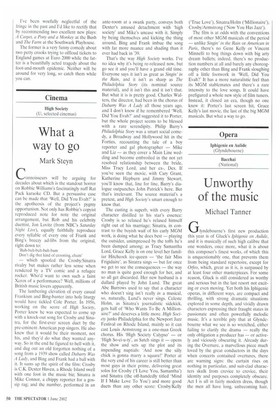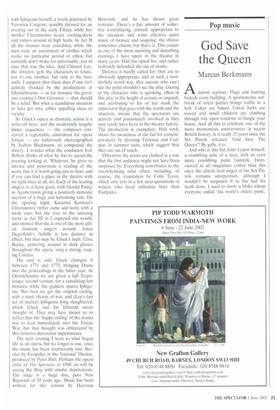Opera
Iphigenie en Aulide (Glyndebourne) Bacchai (National)
Unworthy of the music
Michael Tanner
Glyndebourne's first new production this year is of Gluck's Iphigenie en Aulide, and it is musically of such high calibre that one wonders, once more, what it is about this composer's finest works, of which this is unquestionably one, that prevents them from being standard repertoire, except for Orfeo, which, great as it is, is surpassed by at least four other masterpieces. For some reason, Gluck is still considered as worthy and serious but in the last resort not exciting or even moving. Yet both his Iphigenie operas, in different ways, are compact and thrilling, with strong dramatic situations explored in some depth, and vividly drawn characters expressing their fraught states in passionate and often powerfully melodic music. It's a terrible pity that at Glyndebourne what we see is so wretched, either failing to clarify the drama — really the only obligation a producer has — or actively and viciously obscuring it. Already during the Overture, a marvellous piece much loved by the great conductors in the days when concerts contained overtures, there are warning signs: the curtain rises on nothing in particular, and suit-clad characters skulk from crevice to crevice, their identity and purposes completely obscure. Act I is all in fairly modern dress, though the men all have long, unbecoming hair.
with lphigenie herself, a lovely portrayal by Veronica Cangemi, sensibly dressed for an evening out in the early Fifties, while her mother Clitemnestre wears evening-dress and totters around in high heels. In Act II all the women wear crinolines, while the men wear an assortment of clothes which evoke no particular period or ethos, but certainly don't make for universality, just in case that was the idea. And Christof Loy, the director, gets the characters to relate, not to one another, but only to the bare walls. I suppose that these days if one isn't actively shocked by the productions at Glyndebourne — as for instance the previous evening's Don Giovanni — that should be a relief. But what a scandalous situation to have got into, either appalling ideas or vacuity.
So Gluck's opera as dramatic action is a write-off here, and the moderately lengthy dance sequences — the composer conceived a regrettable admiration for opera lyrique — are ludicrously choreographed by Jochen Heckmann, to compound the misery. I wonder what the conductor Ivor Bolton thinks of what he has to spend the evening looking at. Whatever, he gives so intense and passionate a reading of the score that it is worth going just to hear; and if you can find a place in the theatre with no sight-lines at all, do. Each of the leading singers is at least good, with Gerald Finley as Agamemnon giving a positively demonic account of a huge and harrowing role. On the opening night, Katarina Karneus's Clitemnestre rather came and went, with a weak start, but she rose to the amazing scene in Act III as I expected she would, and showed that she is one of the most gifted dramatic singers around. Jonas Degerfeldt's Achille is less decisive in effect, but that may be Gluck's fault. Clive Bayley, pottering around in dark glasses throughout the opera, sang a strong, rasping Catch as.
The end is odd. Gluck changed it between 1774 and 1775, bringing Diana into the proceedings in the latter year. At Glyndebourne we are given a full Tiepolesque second version, for a tantalising few minutes, while the goddess spares Iphigenie. But then we get the original ending, with a stark chorus of war, and (Loy's last act of malice) lphigenie lying slaughtered, which Gluck and his librettist never thought of. They may have meant us to reflect that the 'happy ending' of the drama was to lead immediately into the •Trojan War, but that thought was obliterated by this intrusive directorial impertinence.
The next evening I went to what began life as an opera, but no longer is one, since the music has been irretrievably lost: Bacchai by Euripides at the National Theatre, produced by Peter Hall. Perhaps the opera critic of The Spectator in 4500 AD will be seeing the Ring with similar deprivations. The stage is a huge disc, pure New Bayreuth of 50 years ago. Music has been written for this version by Harrison
Birtvvistle, and he has shown great restraint. There's a fair amount of seductive wind-playing, entirely appropriate to the situation; and some effective quiet music of menace and suspense; the chorus sometimes chants, but that's it. This counts as one of the most stunning and disturbing evenings I have spent in the theatre in many years. Hall has opted for, and rather verbosely defended, the use of masks.
Defence is hardly called for: they are so obviously appropriate, and in such a wonderfully weird way, that anyone who can't see the point shouldn't see the play. Gazing at the character who is speaking, often in this play in the height of ecstasy or anguish, and attributing to his or her mask the expression that goes with the words and the situation, means that the spectators are actively and passionately involved as they may rarely have been in the theatre before. The production is exemplary: Hall wryly shows his awareness of the fad for contemporaneity by dressing Teiresias and Cadmus in summer suits, which suggest that they are out of touch.
Otherwise the actors are clothed in a way that the first audience might not have been surprised by. Everything contributes to the overwhelming total effect, including, of course, the translation by Colin Teeva, which only errs in a few near-quotations of writers who lived millennia later than Euripides.







































































 Previous page
Previous page